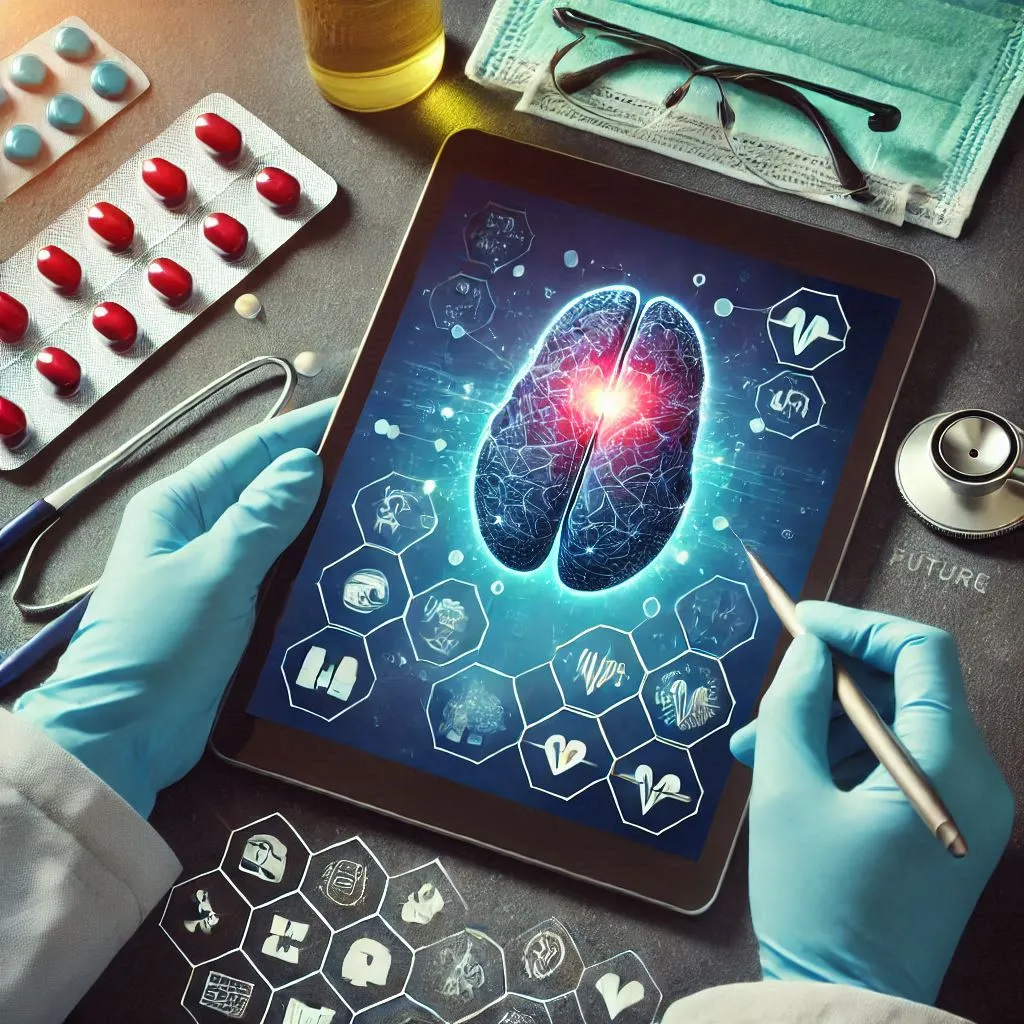The healthcare industry is on the brink of a major transformation, due to machine learning (ML). By enabling faster, more accurate diagnosis, personalized treatments and improved patient care, ML is already making a big difference in healthcare today. However, the true potential of ML is yet to be realized.
In the coming decade, we are likely to see ML integrated into even more aspects of healthcare, to push boundaries further and open new possibilities. This post explores the future of Machine Learning in Healthcare, along with the emerging trends, key advancements and ethical considerations etc.
Key Trends in Machine Learning for Healthcare
1. Predictive Analytics for Proactive Healthcare
Predictive analytics in healthcare uses large amounts of patient data to forecast health outcomes. Machine learning enables predictive models that analyze patterns, which enables physicians to anticipate issues before they arise.
– Disease Prediction: By using ML algorithms, healthcare providers can predict chronic illnesses like diabetes or heart disease based on risk factors, such as family history, lifestyle and medical records. This helps to prevent complications and guide patients to make lifestyle adjustments early.
– Hospital Resource Management: Predictive analytics can help hospitals to manage resources more effectively by forecasting patient volume, bed requirements and staffing needs. For example, during flu season, machine learning models analyzed historical data to predict patient influx, which allowed hospitals to prepare accordingly.
– Case Study: A study at Johns Hopkins Hospital used predictive analytics to identify patients at risk of developing sepsis, a life threatening condition. With ML algorithms, physicians could predict sepsis onset hours in advance, which lead to timely interventions and improved patient outcomes.
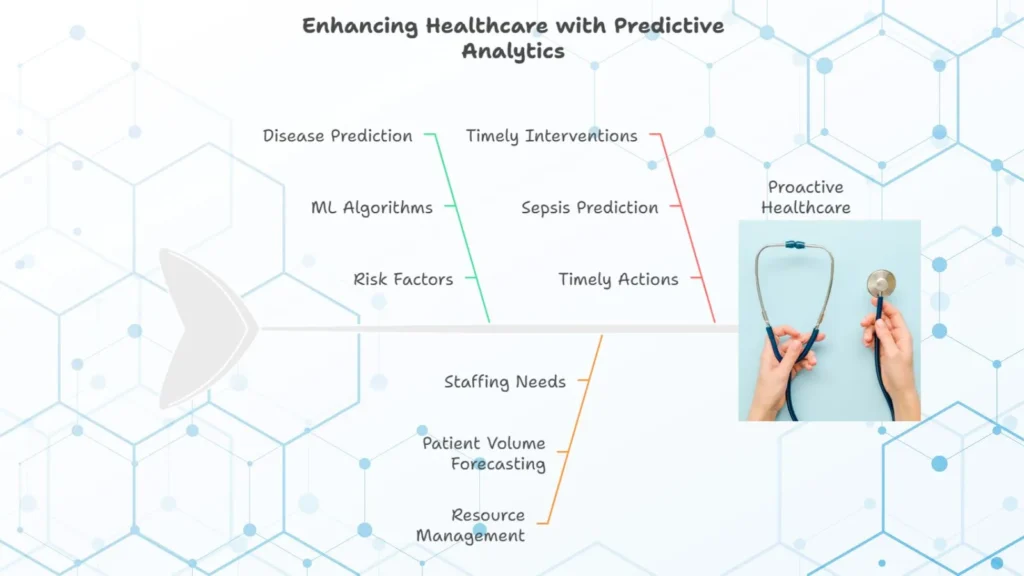
2. Telemedicine and Remote Patient Monitoring
Telemedicine, accelerated by the COVID-19 pandemic, has become a crucial aspect of modern healthcare. Machine learning enhances telemedicine by enabling more accurate remote diagnostics and personalized care.
– Remote Monitoring Devices: Wearable devices, like heart rate monitors and glucose trackers, generate real time data. ML algorithms process this data to provide information, alerting healthcare providers to potential health concerns. For instance, a patient with a heart condition can be monitored remotely, with ML algorithms analyzing any irregularities in heart rhythm.
– Personalized Patient Interventions: Telemedicine platforms powered by ML can offer personalized recommendations and treatments based on patient history and real time data. This enables healthcare providers to deliver tailored care remotely, to improve patient outcomes.
– Case Study: Mayo Clinic has integrated ML algorithms into its telemedicine services, which allows doctors to detect irregular heart rhythms in patients remotely. This early intervention has helped to prevent heart related emergencies.
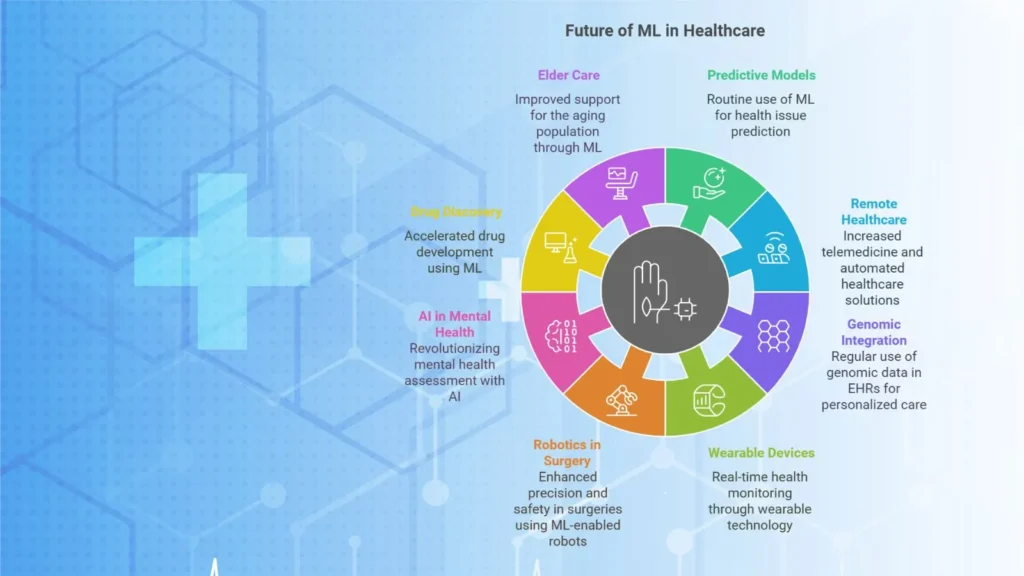
3. Genomics and Precision Medicine
ML is unlocking the potential of genomics, where personalized treatments are based on an individual’s genetic makeup. Genomic analysis is a data intensive process. ML helps to process vast datasets, find genetic markers and predict disease risks. This approach, known as precision medicine, which enables for more accurate, individualized treatment plans.
– Personalized Treatment Plans: ML models analyze genetic data to identify unique patterns that may predict how a patient will respond to certain medications or therapies. For example, cancer patients may receive customized treatment plans based on genetic markers.
– Disease Prevention: With ML’s data crunching power, genomics can identify individuals at high risk for diseases, enabling preventive care. Predictive genetic testing is already helping individuals learn their susceptibility to conditions like Alzheimer’s or Parkinson’s.
– Case Study: IBM Watson has collaborated with several hospitals to analyze genetic data, helping doctors choose the most effective cancer treatments based on each patient’s unique genetic profile.
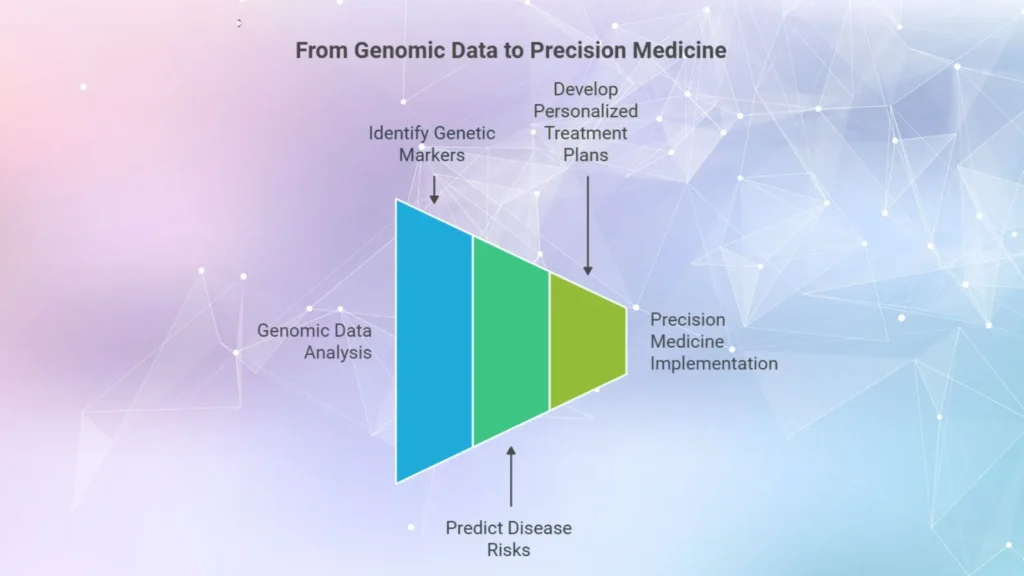
Emerging Technologies in ML for Healthcare
1. AI Powered Diagnostics
AI is revolutionizing medical imaging with techniques like computer vision. ML algorithms can now detect signs of diseases in images (like X-rays, MRIs and CT scans) with high accuracy, often spotting anomalies that human eyes might miss.
– Example: Deep learning algorithms like Google’s DeepMind are applied in radiology to detect abnormalities in breast cancer screenings with impressive accuracy.
– Future Potential: In the next decade, AI driven diagnostic systems could be fully integrated into primary care facilities, which allows patients to get instant diagnostic results for certain conditions.
2. Virtual Health Assistants and Chatbots
Chatbots and virtual assistants are another area where ML is transforming healthcare. They offer initial patient engagement, symptom assessment and even mental health support.
– Future Potential: These virtual assistants are expected to evolve, by becoming more sophisticated and capable of handling more complex patient interactions. AI assistants could provide reminders for medication, check in on patient progress and give initial advice based on symptoms.
– Example: Woebot, a mental health chatbot, uses NLP and ML to engage with users, provides real time responses and emotional support, which has proven beneficial in managing stress and anxiety.
Ethical Considerations in Machine Learning for Healthcare
As with any technological advancement, there are ethical concerns to consider in the use of ML in healthcare. These considerations will play a critical role in shaping the technology’s future.
1. Data Privacy and Security
Healthcare data is highly sensitive and the increasing integration of ML requires strict privacy measures. Which ensures data security and compliance with regulations like HIPAA (Health Insurance Portability and Accountability Act). This is essential to protect patient privacy.
– Future Solution: The future of ML in healthcare may include advanced encryption methods, secure data sharing platforms and decentralized data storage to address privacy concerns.
2. Bias and Fairness in ML Models
ML models can inherit biases present in training data, which can lead to unfair or inaccurate predictions. For instance, if a diagnostic model is trained primarily on data from one demographic group, it may perform poorly for others.
– Future Solution: As awareness of ML bias grows, organizations are working on creating more inclusive datasets and developing fairness focused algorithms. Regulatory standards for ML fairness in healthcare may also emerge in the future.
3. Accountability and Transparency
ML models, especially complex ones like deep learning, often operate strangely where it is difficult to understand how they make decisions. In healthcare, where patient lives are at stake, transparency in decision making is very important.
– Future Solution: Making machine learning (ML) models understandable and transparent is likely to become a common practice, with regulations that need explainable models.
Predictions for the Future of ML in Healthcare
The future of machine learning in healthcare holds exciting possibilities, driven by rapid advancements in technology. Here is what we can expect in the next decade:
1. Predictive Healthcare Models as Standard Practice
Predictive healthcare will become routine, with ML models predicting potential health issues before they arise. Preventive medicine will take precedence, which leads to healthier populations and reduced healthcare costs.
2. Greater Adoption of Remote and Automated Healthcare
With the rise of telemedicine and virtual consultations, ML will enable more automated healthcare solutions, where patients can access medical advice and routine consultations from home. Remote monitoring and diagnostics will enhance patient care, especially for chronic disease management.
3. Integrated Genomic Data for Preventive Care
In the coming years, genomic data will be regularly integrated into electronic health records (EHRs), which gives physicians a comprehensive view of a patient’s health. This data, combined with ML algorithms, will allow for highly personalized preventive healthcare measures.
4. Increased Use of Wearable Devices for Real Time Monitoring
Wearable devices, powered by ML algorithms, will continue to gain popularity. They will provide real time monitoring for conditions like heart disease, diabetes and sleep disorders, which enables physicians to adjust the treatment based on collected data.
5. Increased Use of Robotics in Surgery:
With ML enabled robotics, surgeries will become more precise, minimally invasive and safer. These robots use real time data to assist surgeons, which reduces human error and improves patient recovery times.
6. Greater Integration of AI in Mental Health:
Machine learning could revolutionize mental health by analyzing speech patterns, facial expressions and behavioral data to assess a patient’s mental state. Early diagnosis of conditions like depression and anxiety could lead to faster treatment interventions.
7. Advances in Drug Discovery:
Drug discovery is typically a lengthy and costly process. With ML, pharmaceutical companies can analyze large datasets to identify potential drug candidates faster. This can expedite the development of treatments for diseases that currently lack effective drugs.
8. Improved Elder Care:
ML will play a very important role in supporting the aging population. Predictive analytics and telemedicine can monitor the elderly remotely, to detect falls, manage medication schedule and alert caregivers for potential health issues.
9. Enhanced Precision in Diagnostics:
With advancements in image recognition and natural language processing, ML will improve diagnostic accuracy in areas like radiology and pathology. Doctors can analyze medical images and lab results faster, with AI suggesting potential diagnoses and treatments.
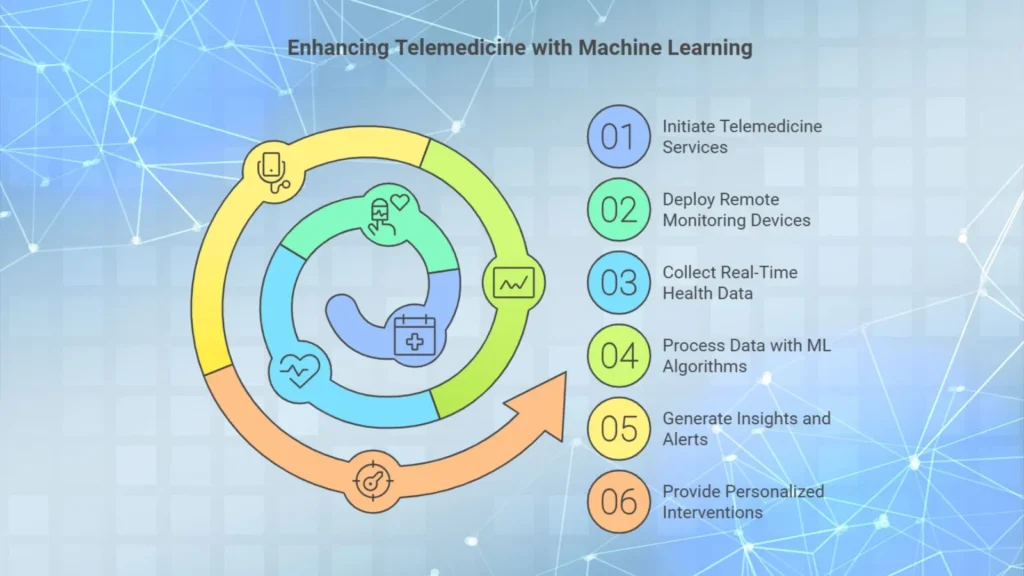
Case Studies: Real World ML Applications in Healthcare
IBM Watson for Oncology
IBM Watson is a pioneer in using ML for personalized treatment plans. Watson for Oncology analyzes patient data, including medical history, genetics and lifestyle, to suggest treatment options based on clinical evidence. Hospitals worldwide use Watson for Oncology to improve cancer treatment.
Google’s DeepMind and NHS Collaboration
In a partnership with the UK’s National Health Service (NHS), Google DeepMind developed a predictive model to detect acute kidney injury. By analyzing patient data, DeepMind’s model can predict kidney failure, to enable early intervention.
Challenges in Adoption of ML in Healthcare
While the potential of machine learning in healthcare is large, several challenges must be taken care of:
1. Regulatory Hurdles:
As machine learning applications grow, regulatory bodies like the FDA must establish guidelines to ensure that ML models meet safety and efficacy standards.
2. Technical Limitations:
Machine learning in healthcare requires powerful computational resources. Smaller healthcare institutions may face challenges in accessing and implementing ML solutions.
3. Interdisciplinary Collaboration:
Integrating ML in healthcare requires collaboration among data scientists, healthcare providers and regulatory bodies. Bridging this gap is necessary for successful adoption.
4. High Costs:
The upfront costs of ML implementation can be high, which may deter smaller healthcare providers from adopting these technologies. However, as the technology matures, costs are expected to decrease.
Conclusion
The future of machine learning in healthcare is filled with promise. With predictive analytics, telemedicine, genomics and other emerging technologies, ML is set to revolutionize the healthcare industry. While there are challenges like data privacy, ethical considerations and high costs, ongoing advancements are expected to make ML more accessible and effective.
Machine learning’s ability to analyze vast amounts of data and provide actionable information will continue to push healthcare toward a more personalized, efficient and proactive approach. For patients, this means better diagnoses, more suitable treatments and a healthcare system that anticipates needs rather than reacting to crises.
The coming decade holds transformative potential as ML technologies evolve, the ultimate goal will be to create a healthcare system that is more efficient, equitable and patient centered.

